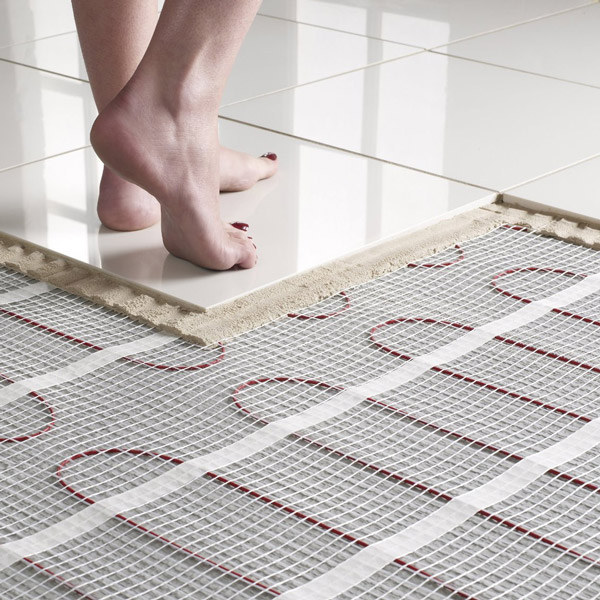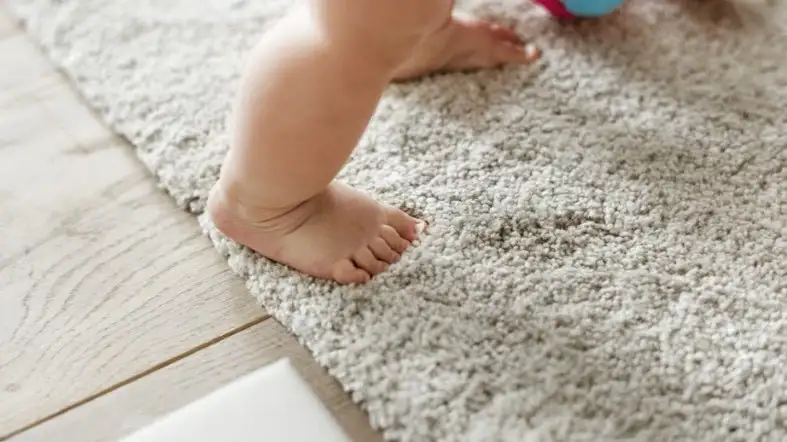Imagine stepping out of bed on a crisp winter morning, only to find your feet met with the icy embrace of a tile floor. You shiver, longing for the warmth of a rug, but then a crucial question arises: can you even put a rug on a heated tile floor? Is it safe? Will it interfere with the heating system? This is the dilemma many homeowners face, particularly in colder climates where heated floors are a welcome addition.

Image: www.egstas.com
The answer, much like most things in life, is not a simple yes or no. Whether or not you can safely place a rug on a heated tile floor depends on several factors, including the type of heating system, the rug’s material, and the specific guidelines provided by the manufacturers.
Understanding Heated Tile Floors
Heated tile floors, also known as radiant floor heating, have become increasingly popular in both residential and commercial settings. These systems provide a comfortable and even warmth throughout the room, eliminating the drafts and uneven temperatures associated with traditional radiators or forced air systems.
There are two primary types of heated tile floor systems:
Hydronic Heating
Hydronic systems use hot water circulating through pipes embedded under the tile to generate heat. This method is generally considered quieter and more energy-efficient than electric systems.
Electric Heating
Electric heating systems utilize electric cables or mats installed under the tile. These cables generate heat through electrical resistance. Electric heating provides a quicker response time but can be less energy-efficient than hydronic systems.

Image: whatsizebro.com
Rug Materials and their Compatibility
The choice of rug material can impact the performance of your heated floor system. Certain materials may act as insulators, hindering the heat transfer to the room.
Natural Fibers
Natural fibers like wool, cotton, and jute are often used in rugs. These materials can provide a luxurious feel underfoot but can be more prone to trapping heat, potentially causing a reduction in efficiency.
Synthetic Fibers
Synthetic fibers, such as polyester, nylon, and acrylic, are generally better conductors of heat than natural fibers. They offer a more uniform heat distribution and are often easier to clean.
Rug Thickness
The thickness of the rug is another factor to consider. Thicker rugs will have a greater insulating effect, reducing the heat reaching the room.
Rug Construction
The way the rug is constructed can also affect its compatibility with a heated floor. Rugs with a thick backing or those with a pile that is too dense can hinder heat transfer.
Safety Considerations
Using a rug on a heated tile floor requires careful attention to ensure safety. Here are some key points:
Manufacturer Guidelines
Always consult with the manufacturer of your heated floor system and the rug you plan to use. They provide specific recommendations for safe use and compatibility.
Heat Control
Ensure you have a thermostat or controller for your heated floor system, allowing you to adjust the temperature to a safe level.
Rug Placement
Avoid placing rugs directly on the thermostat or sensor of the heating system. This can interfere with the functioning of the system. Be aware of the sensor’s location and ensure the rug doesn’t cover it completely.
Rug Material
Choose a rug made from materials that are heat-resistant and don’t pose a fire hazard. Avoid rugs made from materials that can melt or ignite at high temperatures.
Regular Inspections
Periodically inspect the rug and the underlying floor heating system for any signs of damage or malfunction. Check for any discoloration, fraying, or hot spots that may indicate a problem.
Tips for Selecting and Using a Rug on Heated Tile Floors
Here are some practical tips for choosing and using a rug on heated tile floors:
Consider a thinner rug
If you choose a rug, opt for a thinner rug with a lower pile height to ensure maximum heat transfer to the room.
Select materials carefully
Choose rugs made from materials that are known for their heat conductivity, such as synthetic fibers or rugs with a more open weave.
Avoid excessively thick rugs
Thick rugs with dense piles can significantly reduce the efficiency of your heated floor system.
Maintain a safe distance
Ensure the rug is placed at a safe distance from the heating elements. Follow the manufacturer’s recommendations for spacing.
Use a rug pad
A rug pad can provide a buffer between the rug and the heated floor, helping to dissipate heat more evenly. Select a rug pad designed for use with heated floors.
Can You Put A Rug On A Heated Tile Floor
Conclusion
In conclusion, while placing a rug on a heated tile floor is possible, it requires careful consideration of the factors mentioned above. Choose a rug material and construction that is compatible with the heating system, maintain a safe distance from heating elements, and always adhere to the manufacturer’s guidelines. With the right approach, you can enjoy the warmth of a heated floor with the added comfort of a rug, enhancing the aesthetic appeal and coziness of your space.





